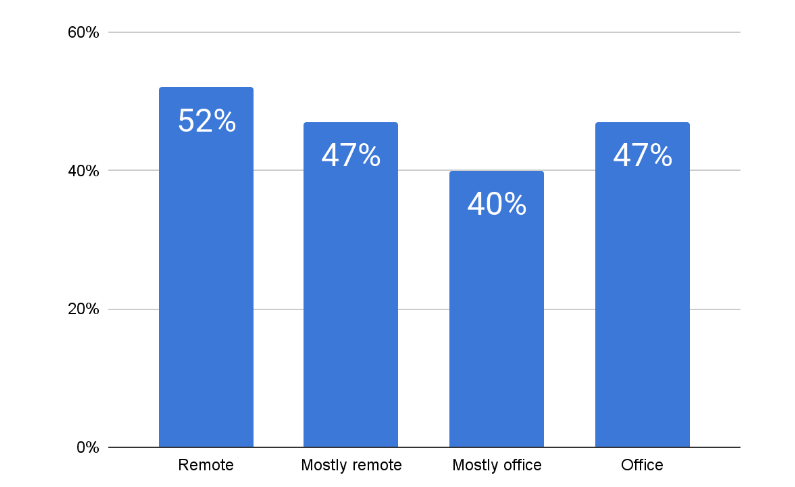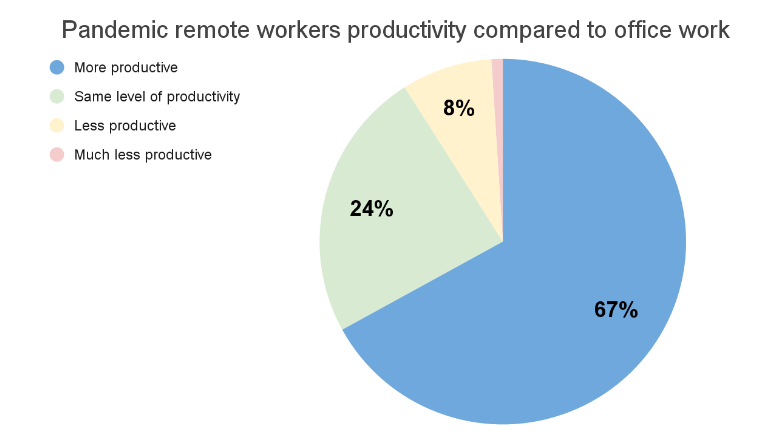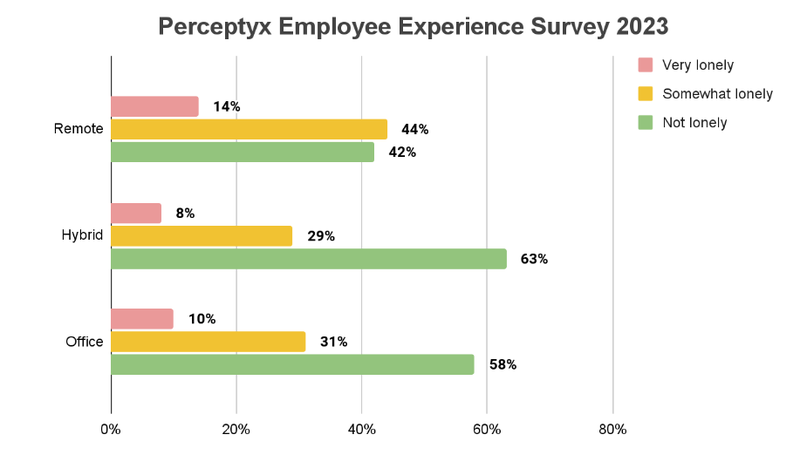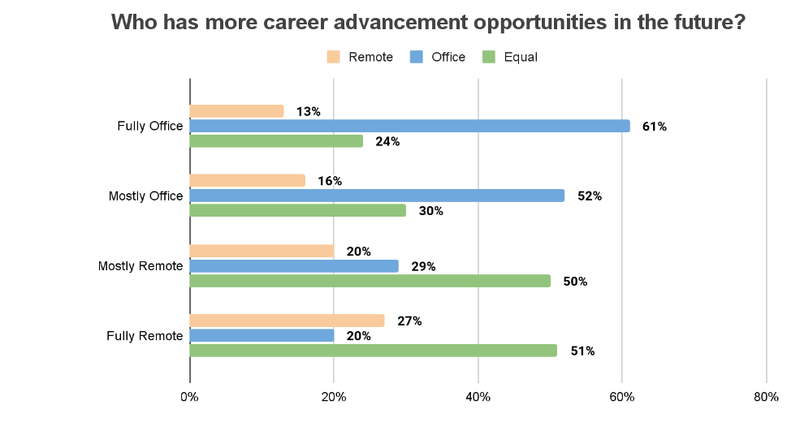Remote work is gradually becoming more popular and desirable among workers, especially young adults of the 21st century who value their time more than their parents did. This is completely understandable, given its many advantages.
Costs and time spent on transportation are reduced; you can choose a quieter and more comfortable workplace (most of the time); and even lower risks of respiratory diseases are among the many benefits. However, like everything in this world, remote work also has its downsides.
In this article, we will examine both the advantages and disadvantages of remote work, consider their impact on career advancement opportunities, and draw our own conclusions on the matter.
Happier than ever
And when I say happier, I mean it. According to the CNBC Momentive Workforce Survey, remote workers are the happiest overall with their working conditions. The least happy are hybrid workers who have to work mostly from the office. 'Mostly remote' and 'office' workers are equally satisfied with their jobs.

Some employers groundlessly think that remote workers are happier simply because they are not as hard-working as their office counterparts. Nonetheless, many studies show that employee productivity is usually more dependent on mental and physical conditions than the physical workspace. This is why many remote workers are actually more productive and more satisfied in general. Research on the productivity levels of pandemic remote workers compared to when they worked in the office, conducted by Owl Labs, shows that 91% of workers feel equally or more productive.

Isn’t it wonderful? But let’s not forget that we are also discussing the disadvantages. There is always a flip side to the coin, so let’s take a look at that as well.
- 52% of remote workers find themselves very happy with their work, compared to only 47% and 40% of full office and mostly office workers, respectively
- Many employers mistakenly think the remote format affects productivity
- 67% of surveyed remote workers feel more productive compared to times when they worked in the office
- Only 9% feel less productive compared to times when they worked in the office
Abandoned
Levels of loneliness and stress are rising among remote workers every year, mostly due to the difficulty of separating work-life from personal life. When you live and work in the same place, it can feel like you are working all the time. Additionally, remote workers tend to overwork more. According to the same Owl Labs report, 55% of remote workers spend more time working than they did in the office. All these problems contribute to employees' confidence and career opportunities.

Remote workers, especially in companies where most employees work in the office, often describe their feelings with the word 'abandoned.' This highlights a key difference between 'remote-friendly' and 'remote' companies.
Remote-friendly companies typically don’t hire employees in a remote format. However, they may make exceptions in certain circumstances, such as when the company wants to retain a valuable employee or when there is an exceptional candidate who is only available remotely. At first, this arrangement sounds great: the employer values you so much that they are willing to change their work format for you. However, the longer you work for such a company, the more problems you may encounter.
Meetings are all conducted in person; no one cares enough to invite you via call or record it for you. All meaningful decisions are made without your knowledge because, again, everything is done in person. When it comes to promotions, you are probably somewhere at the bottom of the list.
How employees view it
Even employees don’t believe that remote workers have more career advancement opportunities than their office colleagues. The CNBC Survey we mentioned earlier also shows that most employees believe office workers have more promotion opportunities.

- Despite saving time from commuting, people tend to overwork more when working remotely. This often happens due to difficulties in dividing work and personal life when working from home
- 58% of remote workers report feeling 'very lonely' or 'lonely,' compared to 41% of office workers and 37% of hybrid workers
- Remote-friendly companies often are unable to provide fully equal work conditions for remote workers. Thus, office workers receive more attention, recognition, and promotion opportunities
- Employees also tend to believe that office workers have more career advancement opportunities
Career ladder challenges
Sooner or later, career growth leads to leadership roles and team management. Why is this a problem for remote workers? Because advanced roles require a certain set of skills that are very hard to learn without physically being present in the office.
All of these soft skills are related to various types of communication: manager-employee, manager-manager, and manager-business partners. Each type of communication requires different skills.
💬 Communication skills
In general, the ability to express thoughts clearly, provide accurate and clear responses, assign tasks, and describe them are all essential aspects of management roles.
Moreover, every conversation style is different, depending on the partner and the situation. You should know how to praise and reprimand an employee correctly, how to communicate with business partners and clients, and so on.
😭 Emotional Intelligence
This is a difficult skill to master. Not only do you have to be able to control your own emotions and reactions, but you also need to know how to control and influence the emotions of people around you.
😡 Conflict resolution
This skill can also be used in different settings: resolving conflicts between two members of the team you manage, addressing dissatisfaction with work conditions, and handling misunderstandings between your team and another team — all of which fall under the manager's responsibility, which is you.
💪 Leadership
While this skill may be seen as a summarizing term for most of the mentioned skills, leadership also encompasses other management responsibilities: the ability to guide and inspire your team to achieve better results, as well as the ability to make decisions and assume responsibility for them.
⏳ Time management
While this skill is not directly related to communication, it is essential for any employee. That's precisely why it's important to develop this skill from the manager's perspective.
When you work remotely and manage your work and free time, you need to think about your deadlines and projects. As a manager, your time management skills come into play not only for your own tasks but also for dividing tasks among team members, overseeing project development, organizing work so that every team member, whether in the office or remote, is available during certain meeting hours, and much more.
- When advancing to management positions, people need to acquire a certain set of soft skills
- Developed communication skills are essential in any management position and situation
- Emotional intelligence and conflict resolution skills allow a manager to resolve any emerging problems and misunderstandings, as well as communicate effectively with business partners
- Both leadership and time management skills are core to management positions: providing guidance, inspiration, achieving results, meeting deadlines, and allocating tasks are all everyday tasks of a manager
These soft skills are an undeniable and very important part of a manager’s expertise. The most crucial aspect is that most of them can only be developed through real-life communication and problem-solving, by being actively involved in the process rather than merely observing from the sidelines.
How can a person who feels deep loneliness and struggles without live communication become skilled enough to lead other people? Developing these soft skills through books, courses, and other self-learning tools may be useful, but it is not really efficient without ample practice.
- Soft skills are mostly developed through on-site communication with colleagues, bosses, other teams, and customers
- Given that many remote workers report loneliness and a lack of communication, it would be much harder for them to develop these soft skills
- Self-learning tools like books and courses provide theoretical knowledge, but they do not offer effective practice
The career ladder can be both vertical and horizontal. For those who want to build a successful career while working entirely from home, the horizontal option may be much better. But what does that mean?
Horizontal career ladder
While a vertical ladder gradually leads to management, supervisory, and chief positions, a horizontal ladder allows you to stay at the same level while slightly (or significantly) changing the position you work in, all within the same field.
For example, a quality assurance specialist may eventually grow into a QA team lead or higher. But if the person doesn’t see themselves in leadership, they can move to roles in cybersecurity, software development, and more. They change positions within the IT industry.
Undoubtedly, transitioning from a QA specialist to a backend developer requires acquiring new skills. However, most of these are hard skills that can be learned through courses and self-practice without much difficulty.
- The horizontal career ladder allows people to transition to different positions within the industry or even the company's department without moving into leadership roles
- Advancing to another position still requires learning new skills, but most of them are hard skills
- Hard skills, unlike soft skills, can be learned effectively through courses, videos, and online practice
Career advancement is something many people aim to achieve at some point in their lives. Therefore, it is crucial to understand what needs to be developed, acquired, and learned beforehand.
If you want to advance to management positions and lead people, it's important to note that this requires soft skills. These skills cannot be learned by yourself without live practice with your team members, manager, and other teams.
If you're interested in working remotely, consider a horizontal career advancement path. This approach allows you to progress in your knowledge and skills while also changing positions within the industry.
